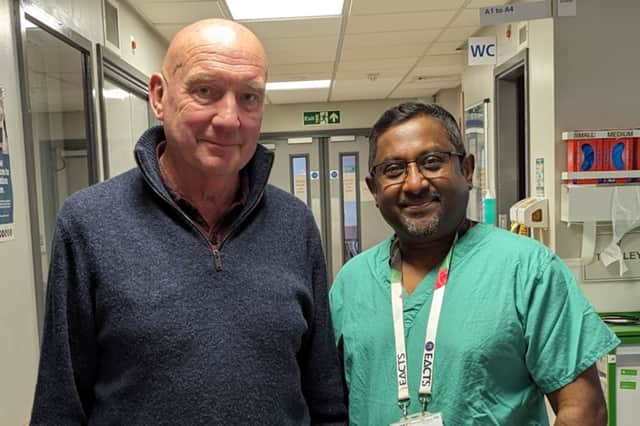NHS: Chesterfield man goes for brain tumour operation - and ends up needing heart surgery


A man who went into hospital for a brain tumour found himself going under the knife for an emergency heart operation.
John Harper, 69 from Chesterfield, was in hospital to have a benign brain tumour removed when he informed the anaesthetist that he had been suffering from breathlessness. A scan revealed that John, a former miner and upholsterer, had severe aortic stenosis, which is a narrowing of the aortic heart valve, and needed to have the valve replaced before he could undergo the brain surgery.
Advertisement
Hide AdAdvertisement
Hide AdWithout treatment, aortic stenosis leads to heart failure and 50 per cent of patients don’t live beyond two to three years.
Because of the need for John to recover quickly for his brain surgery, he was immediately referred to cardiac surgery in Sheffield. The operation went ahead just four days later at the Northern General Hospital. The valve was replaced with a new one made from bovine pericardium, a fibrous membrane that surrounds the heart.
John said: “I was in hospital for the brain operation, and I was only about 30 minutes away from the surgery, when I told the anaesthetist I’d been getting breathless about four weeks before. I thought it would be something to do with the brain tumour, but they said they needed to check it out and found out I had a dicky ticker, and couldn’t go ahead with the brain op until I had the heart op.
“From there it all happened very quickly but I took it in my stride, it had to be done. It was more stressful for my wife, Janet.
Advertisement
Hide AdAdvertisement
Hide Ad“The heart surgery was nowt, just like having a tooth out. It was fantastic. I just have a couple of dots where the cut was made but the scar has healed. Within a few days I was back pottering about on the allotment and my pushbike. I feel like I did when I was 50.”
Consultant Cardiac Surgeon Mr Govind Chetty performed John’s operation. He said: “The main benefit of the minimally invasive ART surgery is that recovery is rapid – there is no big cut, minimal bleeding and no damage to the breastbone. This means there is a shorter stay in hospital and patients can get back to normal activity quickly. For example, they can drive within two weeks and potentially be back at work as well, depending on the nature of their job.
“In Mr Harper’s case, it meant that he was able to have his brain surgery done soon afterwards. It is great to see that he is doing so well.”
Comment Guidelines
National World encourages reader discussion on our stories. User feedback, insights and back-and-forth exchanges add a rich layer of context to reporting. Please review our Community Guidelines before commenting.
